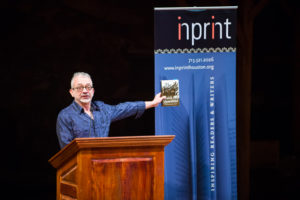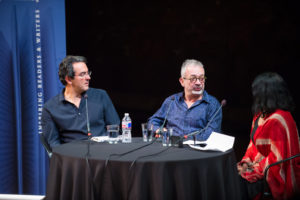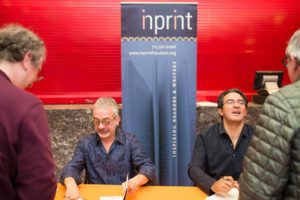Rabih Alameddine & Juan Gabriel Vásquez talk about fiction teaching empathy and guarding our memories
December 6, 2016, by Charlotte Wyatt
 On November 21st, the Alley Theatre was already decked for the holidays. A grove of themed trees in the lobby welcomed the Inprint Margaret Root Brown Reading Series for the final performance of the year. Inside, Rabih Alameddine and Juan Gabriel Vásquez read from their novels on the dormant set of A Christmas Carol, and artificial flurries escaped from their rigging throughout.
On November 21st, the Alley Theatre was already decked for the holidays. A grove of themed trees in the lobby welcomed the Inprint Margaret Root Brown Reading Series for the final performance of the year. Inside, Rabih Alameddine and Juan Gabriel Vásquez read from their novels on the dormant set of A Christmas Carol, and artificial flurries escaped from their rigging throughout.
Though the theater looked towards Christmas, both Alameddine and Vásquez spoke towards the gratitude and displacement so many of us experience on the Thanksgiving weekend, whether or not we return home or reconnect with loved ones. Their words were melancholy and reflective. Alameddine’s The Angel of History spoke of loneliness and makeshift family; the narrator tells his lost love, “you left me roofless in a downpour.” Vásquez prefaced his reading by explaining the words he would read were not his own, and while he thanked his translator, compared the experience to reading someone else’s work.
Alameddine cautioned young writers from writing what they knew, that his own life as fiction would “bore him to tears.”
 The discussion that followed had lighter moments, particularly when the moderator–writer and University of Houston Creative Writing Program faculty member–Chitra Divakaruni, asked about process: Alameddine cautioned young writers from writing what they knew, that his own life as fiction would “bore him to tears.” But the excerpt from Reputations by Vásquez set the evening’s tone. His protagonist, a political cartoonist in Colombia, is reminded, “You’re nobody in this country until somebody wants to hurt you.”
The discussion that followed had lighter moments, particularly when the moderator–writer and University of Houston Creative Writing Program faculty member–Chitra Divakaruni, asked about process: Alameddine cautioned young writers from writing what they knew, that his own life as fiction would “bore him to tears.” But the excerpt from Reputations by Vásquez set the evening’s tone. His protagonist, a political cartoonist in Colombia, is reminded, “You’re nobody in this country until somebody wants to hurt you.”
“You’re nobody in this country until somebody wants to hurt you.”
 Both novelists emphasized the precarious relationship between a writer and the culture that he or she writes about. They agreed distance was helpful, but “you don’t have to leave to be an outsider,” said Alameddine, whose work is banned in a number of countries. Vásquez also discussed how different literary traditions grapple with the role writing can play in social change. He compared literature to a kind of technology, a machine that teaches empathy and that has been “instrumental in the creation of what we call the civilized world.” Alameddine went on to suggest fiction could act as a “guardian of memory,” particularly in cultures where popular media has a short memory (or attention span). Both agreed that urgency in purpose is vital to contemporary fiction, especially in a post-election climate when social and political conflict dominate the news cycle.
Both novelists emphasized the precarious relationship between a writer and the culture that he or she writes about. They agreed distance was helpful, but “you don’t have to leave to be an outsider,” said Alameddine, whose work is banned in a number of countries. Vásquez also discussed how different literary traditions grapple with the role writing can play in social change. He compared literature to a kind of technology, a machine that teaches empathy and that has been “instrumental in the creation of what we call the civilized world.” Alameddine went on to suggest fiction could act as a “guardian of memory,” particularly in cultures where popular media has a short memory (or attention span). Both agreed that urgency in purpose is vital to contemporary fiction, especially in a post-election climate when social and political conflict dominate the news cycle.
 Their work is available at Brazos Bookstore, both online and in-store, and if you didn’t have an opportunity to meet Mr. Alameddine or Mr. Vásquez at the reading, signed copies may still be available. And stay tuned to the Inprint Archive of Readings, a video recording of the entire reading taped thanks to Houston Public Media, will be available soon.
Their work is available at Brazos Bookstore, both online and in-store, and if you didn’t have an opportunity to meet Mr. Alameddine or Mr. Vásquez at the reading, signed copies may still be available. And stay tuned to the Inprint Archive of Readings, a video recording of the entire reading taped thanks to Houston Public Media, will be available soon.

